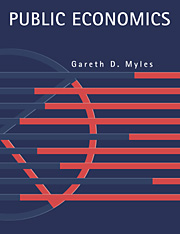Book contents
11 - Imperfect competition
Published online by Cambridge University Press: 05 June 2012
Summary
INTRODUCTION
In the previous chapters, the assumption of competitive behaviour has been maintained throughout. It is often best to view this as a useful restriction for developing initial ideas and eliminating unnecessary complication. As a representation of reality it is clearly flawed, an observation easily supported by casual empiricism. This chapter relaxes the competitive assumption and reviews some of the major results that have been derived within the framework of imperfect competition.
The first point to note is that there are numerous forms of imperfect competition which vary with respect to the nature of products, the strategic variables of the firms, the objectives of the firms and the possibility of entry. Products may be homogeneous or differentiated and the strategic variables of the firms can either be prices or quantities with, possibly, additional instruments such as investment or advertising. The firms' objectives may be individual profit maximisation or, alternatively, joint profit maximisation. Entry may be impossible, so that an industry is composed of a fixed number of firms, it may be unhindered or incumbent firms may be following a policy of entry deterrence. To avoid some of this complexity, this chapter will focus primarily upon economies with quantity setting oligopoly and homogeneous products although at some points conjectures are introduced to permit flexibility. This form of oligopoly has the advantage of being equivalent to monopoly when the industry has a single firm and, under most circumstances, to competition as the number of firms increases without limit.
- Type
- Chapter
- Information
- Public Economics , pp. 348 - 382Publisher: Cambridge University PressPrint publication year: 1995



